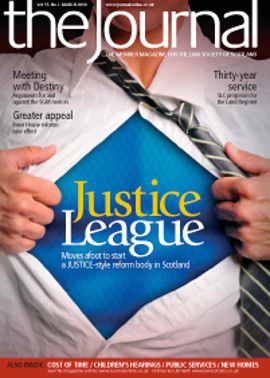The essence of victim

Title and interest to sue
In AXA General Insurance Ltd [2010] CSOH 02 (8 January 2010) Lord Emslie was asked to consider the validity of the Damages (Asbestos-related Conditions) (Scotland) Act 2009. One of the issues was whether the petitioners had the necessary title and interest to sue. In relation to the challenge under the European Convention on Human Rights Lord Emslie, in reviewing the authorities, considered that a victim must be directly affected by a particular measure, act, or decision which was being challenged. Membership of a class affected would suffice. A person indirectly affected would not have the requisite interest unless there existed exceptional circumstances, such as that the person primarily affected was unable to come to court.
As the issues for determination in this area were necessarily fact specific, the criterion for admissibility was not applied in a rigid and inflexible manner throughout the proceedings. The concept of victim was interpreted independently of domestic law concepts. Finally, the issue of admissibility tended to be dealt with as a preliminary issue. Accordingly, a victim seeking a remedy under article 34 of the Convention generally had to be affected in a real and practical way by the issue which was the subject of complaint as opposed to having a remote, tenuous, academic, or theoretical interest in the matter. There was always a potential for a complaint based on the remote, tenuous, etc in exceptional circumstances.
The common law position was not dissimilar to those set out in respect of the Convention. Generally, for a party to have the necessary title, that person had to be party to some legal relation which gave some right which the opponent infringed or denied.
Caution for expenses
In J H Cunningham & Son (Haulage) Ltd v Smith 2010 GWD 5-74 the pursuers sought a seven figure sum from the defenders, who counterclaimed for in excess of £750,000. The defenders moved for caution in terms of s 726 of the Companies Act 1985, an order for consignation of the sum counterclaimed, and the expenses of a proof which was discharged as a result of the pursuers employing new advisers. Lord Menzies considered that the pursuers had a prima facie case against the defenders, but the defenders had a cogent defence and had counterclaimed for a significant sum. Accordingly, caution could not be refused simply by reference to the strength of the pursuers’ case and was ordered.
Consignation should also be granted. The defenders had a prima facie case; the pursuers’ financial position was such that there was a real risk that any judgment pronounced in favour of the defenders would not be satisfied; they were private individuals without protection; and the pursuers’ conduct of the litigation was incompetent and unreasonable, causing the defenders additional expense.
Use of affidavits
In a postscript to the First Division’s decision in Luminar Lava Ignite Ltd v Mama Group plc [2010] CSIH 01; 2010 SLT 147 Lord Hodge made certain observations regarding the use of affidavits and witness statements. Where there were sharp issues of credibility and reliability, evidence should be oral. An affidavit of a witness should be sworn before that person saw any statements from the other party. If the person giving such an affidavit is called to give evidence, the witness should be asked to confirm that the affidavit is true and be given an opportunity to correct anything or amplify anything. The witness should not see the statements from others before information is taken from that person which will ultimately form the affidavit. If the witness is subsequently shown the statements of others and this causes the witness to modify his/her position, then this should be made clear. These observations were approved by the Lord President and Lord Eassie.
Summary cause
In Glasgow Housing Association v Li, Glasgow Sheriff Court, 3 December 2009 Sheriff Principal Taylor recalled the granting of a summary decree at a peremptory diet at which the defender was present and the necessary intimation requirements for a motion for summary decree had not been complied with.
Liquidation
In Redmount Properties Ltd, Edinburgh Sheriff Court, 11 December 2009 Sheriff Holligan considered the provisions of s 204 of the Insolvency Act 1986, whereby a company can be dissolved in circumstances in which the liquidator considers that the realisable assets of the company are unlikely to cover the expenses of the winding up. For the provision to apply, Sheriff Holligan considered that the realisable assets must be insufficient to cover the necessary expenses. Further, it must appear appropriate to the court that such an early dissolution is appropriate.
Such an application would be made after a meeting in terms of s 138 of the 1986 Act. The sheriff observed that by that meeting the liquidator should be in a position to judge whether the assets are sufficient to cover the expenses of the winding up. Circumstances whereby an order might not be made in that event might include issues relating to the directors’ conduct, the trading history of the company, or the necessity to trace an asset. Sufficient information should support such an application, including details of the assets and information as to the likely expenses. Information should be given as to the state of knowledge of the creditors regarding the application and whether there was anything which might render the granting of the application inappropriate.
The application should be made shortly after the s 138 meeting and before the end of the first accounting period. If the order is granted, the liquidator’s actings cannot be approved. The liquidator cannot be exonered and discharged as the court has no information regarding these matters. Sheriff Holligan seemed to suggest that such an application made a considerable time after the commencement of the winding up should be looked at carefully, as such applications often sought to dispense with an audit of the liquidator’s intromissions and to allow the liquidator to keep funds to account of his fees. Such an application seemed entirely at odds with the regulatory regime set out in the liquidation process.
In PEC Barr (Holdings) Ltd v Munro Holdings Ltd, Edinburgh Sheriff Court, 12 February 2010, Sheriff Principal Bowen refused an appeal against the grant of liquidation when the respondents alleged that the debt had been paid. The existence of the debt was supported by affidavits and documentation, as was the satisfaction of the debt. The sheriff had applied the correct test, namely whether there was a fair and reasonable probability of there being a defence. Before allowing oral evidence, the sheriff required to assess the conflicting evidence in its context before deciding that there was a dispute. The process was meant to be a summary one.
Child support
In Secretary of State for Work and Pensions v McCulloch 2009 SLT (Sh Ct) 115 an application had been made to imprison or disqualify a liable person who had failed to pay sums due in terms of a liability order. In an appeal against the dismissal of such an application, Sheriff Principal Taylor made it clear that an inquiry requires to take place before the application is disposed of. I have decided to refer to this decision as it appears to me that such applications are quite common.
Update
Since the last article Smith v The Highland Council (January article) has been reported at 2010 SLT 2; The Royal Bank of Scotland plc v Davidson (November) at 2010 SLT 92; and Wilkie v Direct Line Insurance plc (September) at 2009 SCLR 853.
In this issue
- When is oppression not oppression?
- PAYE penalties – another trap for employers
- Future on the line
- End o' anither auld sang?
- Rights team
- House prices rising – official
- ABS: time to decide
- Streamlining the Inner House
- When cash is king
- The shape of things to come
- Effective participation?
- Keeping tabs on the EU
- How to survive and thrive - read on
- Law reform update
- All-round support
- Family business initiative progresses
- From the Brussels office
- World IP Day approaches
- Going beyond 2010
- Need life be a pressure cooker?
- Ask Ash
- Target practice
- The essence of victim
- Moved with e-motion
- Precious words
- The future of crofting
- A clash of cultures
- If it sounds too good to be true...
- Website review
- Book reviews
- Services transformed
- Consumer Code for Home Builders
- Estate agency fixed fees: the way ahead?






